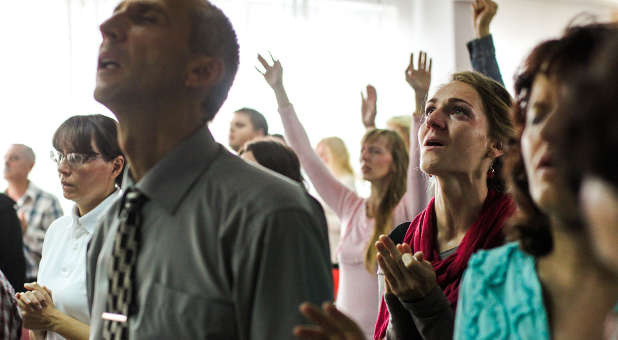
A majority of Protestant churchgoers believe making sacrificial decisions to serve Christ is essential to their faith, and most try to avoid situations that might lead to immoral thoughts or actions.
The 2019 Discipleship Pathway Assessment study from Nashville-based LifeWay Research found two-thirds (66%) of Protestant churchgoers agree with the statement: "A Christian must learn to deny himself or herself to serve Christ," with 38% strongly agreeing.
Only 6% strongly disagree denying self is essential to serving Christ, while 10% somewhat disagree and 18% neither agree nor disagree.
The study identifies obeying God and denying self as one of eight signposts that consistently show up in the lives of growing Christians.
Researchers found significant statistical differences when it comes to ethnicity, religious tradition, geography and education.
Among Protestant churchgoers, Hispanics are the most likely ethnic group to strongly agree (53%) Christians must deny self to serve Christ.
Evangelical Protestants (44%) and black Protestants (40%) are more likely to strongly agree than mainline Protestants (18%).
Protestant churchgoers in the South (40%) are more likely to strongly agree than those in the Midwest (34%). Those with a high school diploma or less (40%) or with some college education (40%) are more likely to strongly agree than those with a graduate degree (34%).
"Choosing God's agenda over our own is not natural," said Scott McConnell, executive director of LifeWay Research. "Many churchgoers understand this tradeoff and are willing to say they should deny their own desires to serve God. But most churchgoers also acknowledge they are not completely letting go."
Researchers also asked Protestant churchgoers if they try to avoid situations in which they might be tempted to think or do immoral things.
Almost 8 in 10 (77%) Protestant churchgoers agree they try to avoid these situations, with 41% strongly agreeing. Another 6% somewhat disagree, while 3% strongly disagree and 15% neither agree nor disagree.
Female churchgoers are more likely to strongly agree they avoid tempting situations than males (43% vs. 38%).
Protestant churchgoers in the South (44%) are more likely to strongly agree than those in the Northeast (37%) and Midwest (36%).
Evangelical Protestants (44%) and black Protestants (39%) are more likely to strongly agree than mainline Protestants (30%) they avoid situations that might tempt them to think or do immoral things.
Those who attend a worship service four times a month or more are more likely to strongly agree than those who attend less than four times a month (42% vs. 38%).
"Walking with Christ involves our beliefs, desires and actions," McConnell said. "When it comes to obedience, our desires are reflected in how much we want to obey and are trying to avoid things that may lead us astray. The majority of churchgoers admit they could be trying harder to avoid temptation."
Two-thirds (66%) of Protestant churchgoers say they live as if they exist to praise and glorify God. A third strongly agrees, with another third somewhat agreeing.
Around 1 in 4 (24%) neither agrees nor disagrees, while 10% disagree they live as if they exist to praise and glorify God.
Hispanics (50%) and African-Americans (43%) are more likely to strongly agree than whites (27%) and other ethnicities (28%).
Black Protestants (43%) and evangelical Protestants (35%) are more likely to strongly agree than mainline Protestants (20%). And those with a high school diploma or less are more likely to strongly agree (38%) they live as if they exist to praise and glorify God than those with more education.
"Being a disciple of Christ is more than a label. It is living out one's purpose. That purpose is not one we design for ourselves, but one God created for us," McConnell said. "Obeying God brings glory to God."
Obeying God and denying self is one of eight signposts measured in the Discipleship Pathway Assessment, which measures an individual's spiritual growth and is addressed in LifeWay's Bible Studies for Life curriculum. For more information, visit DiscipleshipPathwayAssessment.com. ![]()
Carol Pipes is director of corporate communications for LifeWay Christian Resources.
For the original article, visit lifeway.com.
Get Spirit-filled content delivered right to your inbox! Click here to subscribe to our newsletter.
Dr. Mark Rutland's
National Institute of Christian Leadership (NICL)
The NICL is one of the top leadership training programs in the U.S. taught by Dr. Mark Rutland. If you're the type of leader that likes to have total control over every aspect of your ministry and your future success, the NICL is right for you!
FREE NICL MINI-COURSE - Enroll for 3-hours of training from Dr. Rutland's full leadership course. Experience the NICL and decide if this training is right for you and your team.
Do you feel stuck? Do you feel like you’re not growing? Do you need help from an expert in leadership? There is no other leadership training like the NICL. Gain the leadership skills and confidence you need to lead your church, business or ministry. Get ready to accomplish all of your God-given dreams. CLICK HERE for NICL training dates and details.The NICL Online is an option for any leader with time or schedule constraints. It's also for leaders who want to expedite their training to receive advanced standing for Master Level credit hours. Work through Dr. Rutland's full training from the comfort of your home or ministry at your pace. Learn more about NICL Online. Learn more about NICL Online.


